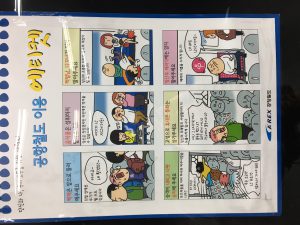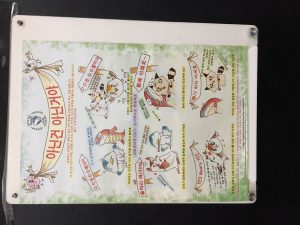Young women are snapping up oxford collared shirts by the dozen, and we’ve seen them in every colour and stripe. Worn traditionally, tucked into short shorts, open over a small dress, or deconstructed with collars and buttons repositioned for interest. Still a little dull to our eye, we suspect the deconstruction will lead us in more adventurous directions soon.
Korean safe space policies
One of the things I like most about Seoul is the culture of visual information. ie signs with pictures. It draws on comic book culture, but also reflects, content-wise, Korean communitarian ethos and values. So informational signs like this one from the subway focus on individuals doing the right thing not for their own safety, but for the safety and comfort of others. Many of the signs also emphasise on younger people’s responsibilities to older people. It’s a really great discursive tool for peeps to have at hand.
Another thing I really like is the way the Dance Safe peeps in Seoul have used these practices to do some pretty impressive stuff. Here is one of the posters I saw stuck up outside SwingTime Bar in Seoul, above one of the benches where everyone sits to change their shoes (Seoul dancers change shoes before they enter the studio space). So, perfect placement.
The poster itself is solid gold. It has a light hearted, charming feel very much in keeping with Korean visual educational media texts. It uses animals rather than ‘women’ or ‘men’ symbols, which means it avoids gender binaries and norms. Even though I don’t read Korean, I can still get the message.
Dance Safe are a group of Korean peeps (men and women!) who’re working super hard to raise awareness about personal safety, sexual harassment, and mutual respect in the biggest lindy hop scene in the world. This is no mean feat, as the sheer scale of the scene means they need a zillion posters, pamphlets, and people involved. They’re doing some fund raising (with the support of various local organisers) to get $$ together to cover their printing costs.
My media studies/cultural studies brain is super interested in this project. This is almost exactly the sort of work I did in my Phd: how do dancers use media texts within a community so focussed on the body?
These guys are doing things that fascinate my academic brain, but also my activist brain and event organiser brain. How, _how_ are they pulling off this stuff?! I see some racist bullshit coming out of the English speaking lindy hop world about ‘Asian’, and ‘Russian’, and ‘French’ dancers, accusing them of not understanding ‘safe space’ ideology ‘because of culture’. But in my experience with dancers from these countries and other NES scenes, the activism is as exciting and engaged – if not more so – than the English speaking world.
Part of me thinks we need a conference to get all of the safe space activists in dance together to share this sort of information. How exciting!
Prague fashion report:
..
..
….impossible. No one seems to live here. Hello? Hello, Czech people?
Nope. The city is empty.
Seoul fashion report:
Shoulder bags and hand bags are de rigeur in this crowded city, and we still see plenty of neutral hues and conservative shades. Printed calico totes are (finally) on their way out, but Seoulsiders specialise in the well-designed fabric carry bag. These soft, practical accessories are perfect with the relaxed silhouette of this warm season.
Seoul Fashion Report:
The younger set are living in their very short shorts, particularly cut off denim in white, blue, and black. But for a softer, dressier warm-evening look, they’re topping them with knee length open shirts in flowing floral cotton. A simple white sleeveless undershirt and sandals complete the look. We aren’t convinced this style will stay, but it’s perfect for summer.
Seoul fashion report:
The simple shift dress in linen or cotton is perfect for summer in Seoul. Matched with sandals of all descriptions, but most pleasingly those with a thicker soul and interesting straps. Features: asymmetrical buttons or a ruffled hem. We still see plenty of raglan sleeves and drop shoulders, and the silhouette is chicly androgynous.
Seoul fashion report:
Seoul is a hot wet mess today, and no one’s staying dry. And after that heat, the rain is a real pleasure! Raincoats are unbearable, so umbrellas are kept to hand. Shoes? Sandals! The Teva comes into its own, and there isn’t a stocking in sight.
Seoul fashion report:
Gentlemen are still saying yes to the horizontal stripe on a tshirt, but make it wide. The wider the better, and in navy or black. Pair it with tidy shorts in black, and finish with sturdy sandals. Teva are very now, but the latest season Doc sandal is very acceptable.
Seoul fashion report:
when the humidity’s high, and the temperature is _hot_, Seoul bares skin. Gentlemen sport sporty shorts, and ladies let their legs breathe in skirts.
Our favourite trend is the calf-length trouser. Only just arriving in Australia, this uncomfortable-in-winter style has stuck around for summer in Seoul. We approve!
Why is there so little space for women in jazz music?
This article asks Why is there so little space for women in jazz music?
All the reasons there are so few women in jazz are as you’d expect:
- sexual harassment and assault discourage women (duh)
- male band leaders find new players for their band via informal social networks, which are fostered in post-gig hangs, peer networks, etc
- there are few role models for younger women
- male players openly encourage young men rather than young women
- the culture of jazz gigs themselves discourage women
- incidental gendered language (eg the ‘guys’ in the band; ‘doesn’t she look lovely’ to women on stage instead of ‘isn’t she a fucking gun’) makes women feel invisible.
If we’ve managed to get completely change the culture of DJing in Australian lindy hop over the past ten years, surely we can change the culture of jazz bands.
How? Same way. Cultural change, structural change, discursive change.
a) Change the everyday culture of jazz gigs (avoid gendered language, use female historic figures in art work),
b) Change work practices and labour conditions (eg penalties for sexual harassment and assault; discourage aggressive, blokey environments; fair pay for fair work; clear agreements and contracts),
c) change uses of language and ideas in discourse (eg watch the way MCs introduce women musos, and the language used in PR).
I think one of the most important elements in changing the culture of live jazz would be to openly address issues of alcoholism and drug abuse in the scene. Because blokey jazzbros who behave in blokey dodgy ways when sober are more likely to be dangerously dodgy when drunk. And those social networking spaces which are essential to professional networking which rely on excessive alcohol abuse will be opened up to people who have to get home to kids and day jobs.
More specifically:
– Band leaders should actively seek out female musicians.
ie not just take the first hand they see waving. They should hunt down good women musicians and put them on their ‘call list’, so they have good names when they’re putting together a band for a gig.
– Women are far more likely to be responsible for domestic labour in their homes and relationships – child care, cleaning, cooking, bill paying, holding down day jobs, etc. So band leaders should allow more flexibility in gig specifics. eg call with more notice so women can book baby sitters; not require long post-gig debriefs and hangs; encourage gigs and social hangs in parent-friendly hours. And they should do things like give women more time to rearrange domestic labour (doing the grocery shopping or laundry, attending children’s school events, etc) and untangle themselves from paid work, etc.
– Male musicians should take responsibility for each other.
They should police each other’s language and behaviour for sexual harassment and assault. eg call their mates out for sexist jokes, for harassment; have a code of conduct for their band and for their gigs (and enforce it); actively _encourage_ respectful treatment of women (both in person and in talk and ideas).
– Male teachers in jazz education should actively encourage girls. They should be mindful of the language they use in class (gendered pronouns?), the examples they use from history, the way they talk about and to girls and boys in class. They should reward collaborative behaviour between students, and discourage aggressive competition.
– Quotas.
Gets women into groups. And once women are there, the simple fact of their presence encourages more women. No, it won’t lower the standard of music. You think all those bros in bands are as good as they think the are, and not just some ordinary musician who’s benefitted from unequal hiring practices? You can guarantee the women you hire are twice as good, and work twice as hard as any bro. And if they’re not, they’ll change their shit up until they are.
– Gig promoters and managers should request bands hire women musicians (not just vocalists), and offer financial bonuses to band leaders who have women in their bands. Straight up.
– Male musicians should ask each other, very loudly “What have you done to change shit today?” They should brag about the fantastic women in their bands. They should GO TO WOMEN’S GIGS and be openly supportive. They should ask women for advice about music and playing.


